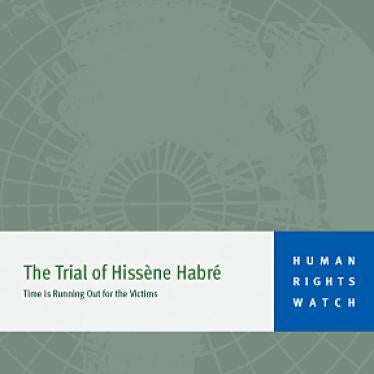Re: Hissène Habré Case– African Union
Honorable Foreign Ministers,
We have the honor of writing you in the name of the victims of the former Chadian dictator Hissène Habré, accused of committing thousands of political killings and systematic torture between 1982 and 1990. The victims have been fighting for more than twenty-one years to bring Habré to justice, and a number of survivors have already died.
As you know, in July 2006, the heads of state and governments of the African Union gave hope to the victims when they mandated Senegal “to prosecute and ensure that Hissène Habré is tried, on behalf of Africa, by a competent Senegalese court with guarantees for fair trial.” More than five years later, Senegal has yet to execute this mandate and has now informed the African Union that Habré will not be tried in Senegal.
Following the refusal of Senegal to prosecute Habré, the Chadian government took the responsible decision on 22 July 2011 to ask Senegal to extradite Habré to Belgium, a country which had already sought his extradition in 2005 (see the official statement of the Chadian government attached). Senegalese courts recently declared a Belgian extradition request inadmissible on technical grounds, but Belgium has said it will file a new extradition request by late January. On 4 January 2012, Senegalese President Abdoulaye Wade announced that he will extradite Habré to Belgium if the courts approve the request.
We support this option as time is the critical factor in this case. Extraditing Habré to Belgium is the most practical and timely option to ensure that he responds to the charges against him with all the guarantees of a fair trial.
In Belgium, a trial could be organized quickly. A Belgian investigating judge, with the assistance of police detectives specialized in the prosecution of crimes against humanity, examined the charges for four years. The team visited Chad in 2002, interviewing Habré’s former accomplices and victims of his regime and analyzing thousands of documents from the archives of Habré’s political police. This strong evidence allowed a Belgian judge to indict Habré on charges of crimes against humanity, war crimes, and torture.
We take note of the willingness of Rwanda to organize this trial in response to an inquiry from the African Union. This offer brings honor to Rwanda, which has also suffered from atrocities committed on its territory.
However, we believe that pursuing this option would call into question the African Union’s efforts to see Habré tried within the strict confines of the law, meaning that the fate of the case should be decided by the courts in accordance with Senegal’s international legal obligations. The law offers a clear response to Senegal’s refusal, for more than five years, to discharge the African Union’s mandate: the extradition of Habré to Belgium.
Moreover, we are particularly concerned that additional years may be needed for Rwanda to enact a legal framework allowing its courts to prosecute crimes that have no direct link to the country, to secure financing for the trial, to restart a complex transnational investigation, and finally to request Habré’s extradition. These are years in which more survivors are likely to die.
We both understand and share the desire to see Habré tried in Africa. More than anyone, we have relentlessly attempted to bring about such a trial for years. Despite our efforts, the time has come to face the fact that the justice tirelessly sought by the victims has not been forthcoming and that, since 1990, the victims have been subjected to what Archbishop Desmond Tutu and 117 groups from 25 African countries denounced in July 2010 as an “interminable political and legal soap opera.”
In July 2011, Navi Pillay, the UN High Commissioner for Human Rights, reminded Senegal that “[i]t is a violation of international law to shelter a person who has committed torture or other crimes against humanity, without prosecuting or extraditing him.” In November 2011, the UN Committee against Torture also reminded Senegal of its obligations under the Torture Convention to either prosecute Habré or extradite him to another country which has sought his extradition – in this case Belgium.
Today the most realistic option to avoid impunity for the mass crimes allegedly committed by Hissène Habré, and the option supported by Chad, is to extradite him for trial to Belgium. We call on the African Union to support this option so that the victims can finally obtain justice.
We thank you in advance for your attention to this matter and kindly request that you accept our highest consideration.
On behalf of:
The Association of Victims of the Crimes of the Regime of Hissène Habré (AVCRHH)
The Chadian Association for the Promotion and Defense of Human Rights (ATPDH)
The African Assembly for the Defense of Human Rights (RADDHO)
Human Rights Watch
The International Federation of Human Rights (FIDH)
Agir Ensemble pour les droits de l’Homme (AEDH)
Chadian League of Human Rights (LTDH)
Senegalese League of Human Rights (LSDH)
ACAT Senegal
Guinean Organization of Human and Citizen’s Rights (OGDH)
Interafrican Union of Human Rights (UIDH)
Ivorian League of Human Rights (LIDHO)
Ivorian Movement of Human Rights (MIDH)
Malian Association of Human Rights (AMDH)
Mauritanian Association of Human Rights (AMDH)
Togolese League for Human Rights (LTDH)
Ditshwanelo [Burundi]
ITEKA League [Burundi]
Electors League [Democratic Republic of Congo]
Groupe Lotus [Democratic Republic of Congo]
International Commission of Jurists, Kenya
Movement for the Defense of Human Rights [Central African Republic]
Attachments :
Official statement of the Chadian government, 22 July 2011
Letter from the UN Committee against Torture to Senegal, 24 November 2011
Statement of Navi Pillay, UN High Commissioner for Human Rights, 12 July 2011
cc: African Union missions in Addis Ababa






